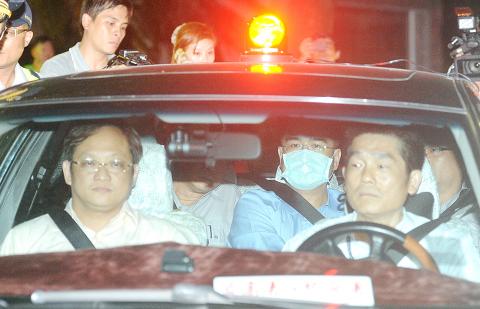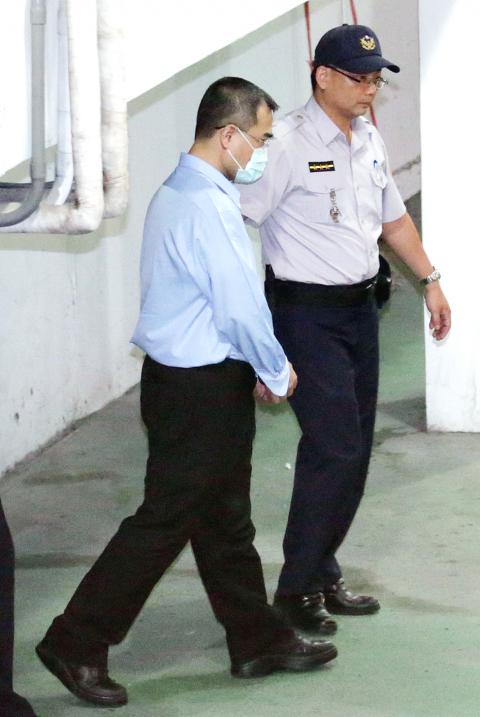Fallout from the scandal involving former Executive Yuan secretary-general Lin Yi-shih (林益世) could spread as Lin reportedly told the man from whom he allegedly demanded a bribe that he needed the money “to buy off some people” to help his company secure procurement contracts.
One day ahead of its scheduled publication date, the Chinese-language Next Magazine yesterday printed what it said was a transcript of conversations between Lin and Chen Chi-hsiang (陳啟祥), head of Kaohsiung-based Ti Yung Co (地勇選礦公司), a metal-recycling firm, that took place on Feb. 25 and March 10.
According to the transcript, Lin demanded that Chen give him NT$83 million (US$2.78 million) when Ti Yung was to renew contracts with CHC Resource Corp (中聯資源) and Chung Yao Corp (中耀企業), from which Lin had helped Ti Yung win contracts in 2010, in return for a NT$63 million bribe from Chen.

Photo: Liu Hsin-de, Taipei Times
CHC Resource Corp and Chung Yao Corp are subsidiaries of state-controlled China Steel Corp (CSC, 中鋼), the nation’s biggest steel maker.
The transcript showed that Chen did not agree to the demand and repeatedly expressed his wish that Lin could decrease the amount, but Lin refused.
“This time is different from last time because it was easy last time. This time it is difficult. The reason why I am imposing [such a large bribe] this time is that I am now in a different position ... I need to nobble some people to keep them quiet,” Lin said, according to the transcript.

Photo: Chien Jung-fong, Taipei Times
In 2010, Lin was a Chinese Nationalist Party (KMT) lawmaker representing a constituency in Greater Kaohsiung. He lost his re-election bid in January this year and was appointed secretary-general of the Executive Yuan in February.
The transcript said Lin told Chen that he needed to buy off several “weiyuan (委員),” but he did not clearly specify what positions they held.
Local media suspected the term weiyuan may have meant lawmakers, lifa weiyuan (立法委員).
In the transcript, Lin brought up the name of KMT Legislator Wang Jin-shih (王進士), based in Pingtung County, but it was not clear whether Wang was involved in this case.
Wang, who is visiting China, issued a statement yesterday saying he had nothing to do with Lin’s case. Wang said he had contacted CSC and CHC Resource Corp once to ask them if they could provide one of his constituents with slag because the petitioner’s company needed the raw material, but his attempt was in vain.
“I don’t know why Lin Yi-shih talked about me,” said Wang, who pledged to cooperate with prosecutors if necessary.
According to the magazine, Chen said he was repeatedly called by Lin’s assistant, Neih Tsun-hsien (聶存賢), to meet with Lin earlier this year.
Chen reportedly said he did follow Neih’s instructions and only decided to record his conversations with Lin in late February after Lin earlier went berserk in response to his unresponsive attitude.
In an eight-minute telephone call late in February, Chen said Lin yelled obscenities at him. After the phone tirade, Neih called him repeatedly to request a meeting, prompting Chen to buy a recording device before he went to see Lin on Feb. 25.
Chen said he did not decide to report the case to Next Magazine until early last month after CSC, CHC Resource Corp and Chung Yao Corp refused to supply his company with materials.
Their refusal to restore supplies to Ti Yung was in defiance of a decision by the Greater Kaohsiung Government on June 1 that Ti Yung had addressed environmental pollution concerns, Chen said.
After June 1, Chen said he called Neih and told him that he wished Lin could “let go” of his businesses. Lin refused and instead gave him an ultimatum, Chen said.
Chen said he was “driven to rebellion by tyranny.”
Lin reportedly told Chen that he had the sole mandate to decide on the heads of CHC Resource Corp and Chung Yao Corp.
Asked to comment yesterday, Premier Sean Chen (陳冲) dismissed Lin’s claims. He said the government appointed executives to state-owned and state-controlled businesses in accordance with procedure, rather than based on a decision made by a single person.
Lin probably said so to bluff Chen Chi-hsiang into thinking that he had that kind of power, the premier said.
The case surfaced on Wednesday last week when Next Magazine reported that Lin accepted a bribe of NT$63 million in 2010 from Chen to help the company secure a slag treatment contract from CSC’s subsidiary.
It was reported that President Ma Ying-jeou (馬英九) learned of the case on Tuesday last week before the magazine went to press.
Next Magazine reported yesterday that Ma failed to distance himself from the case at the very beginning because he believed Lin when he told him that Legislative Speaker Wang Jin-pyng (王金平), who also hails from Greater Kaohsiung, had fabricated the story to tarnish the Ma administration.

AIR SUPPORT: The Ministry of National Defense thanked the US for the delivery, adding that it was an indicator of the White House’s commitment to the Taiwan Relations Act Deputy Minister of National Defense Po Horng-huei (柏鴻輝) and Representative to the US Alexander Yui on Friday attended a delivery ceremony for the first of Taiwan’s long-awaited 66 F-16C/D Block 70 jets at a Lockheed Martin Corp factory in Greenville, South Carolina. “We are so proud to be the global home of the F-16 and to support Taiwan’s air defense capabilities,” US Representative William Timmons wrote on X, alongside a photograph of Taiwanese and US officials at the event. The F-16C/D Block 70 jets Taiwan ordered have the same capabilities as aircraft that had been upgraded to F-16Vs. The batch of Lockheed Martin

GRIDLOCK: The National Fire Agency’s Special Search and Rescue team is on standby to travel to the countries to help out with the rescue effort A powerful earthquake rocked Myanmar and neighboring Thailand yesterday, killing at least three people in Bangkok and burying dozens when a high-rise building under construction collapsed. Footage shared on social media from Myanmar’s second-largest city showed widespread destruction, raising fears that many were trapped under the rubble or killed. The magnitude 7.7 earthquake, with an epicenter near Mandalay in Myanmar, struck at midday and was followed by a strong magnitude 6.4 aftershock. The extent of death, injury and destruction — especially in Myanmar, which is embroiled in a civil war and where information is tightly controlled at the best of times —

Taiwan was ranked the fourth-safest country in the world with a score of 82.9, trailing only Andorra, the United Arab Emirates and Qatar in Numbeo’s Safety Index by Country report. Taiwan’s score improved by 0.1 points compared with last year’s mid-year report, which had Taiwan fourth with a score of 82.8. However, both scores were lower than in last year’s first review, when Taiwan scored 83.3, and are a long way from when Taiwan was named the second-safest country in the world in 2021, scoring 84.8. Taiwan ranked higher than Singapore in ninth with a score of 77.4 and Japan in 10th with

China's military today said it began joint army, navy and rocket force exercises around Taiwan to "serve as a stern warning and powerful deterrent against Taiwanese independence," calling President William Lai (賴清德) a "parasite." The exercises come after Lai called Beijing a "foreign hostile force" last month. More than 10 Chinese military ships approached close to Taiwan's 24 nautical mile (44.4km) contiguous zone this morning and Taiwan sent its own warships to respond, two senior Taiwanese officials said. Taiwan has not yet detected any live fire by the Chinese military so far, one of the officials said. The drills took place after US Secretary